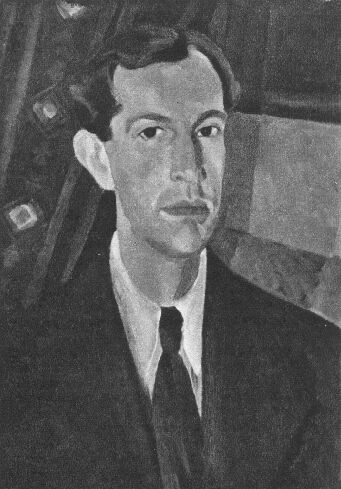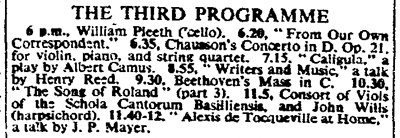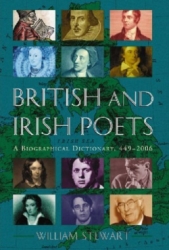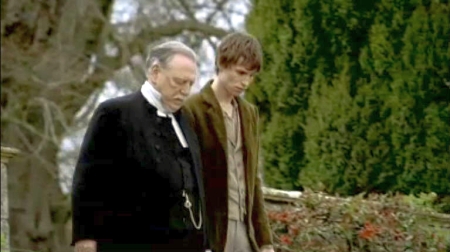|
|
Documenting the quest to track down everything written by
(and written about) the poet, translator, critic, and radio
dramatist, Henry Reed.
An obsessive, armchair attempt to assemble a comprehensive
bibliography, not just for the work of a poet, but for his
entire life.
Read " Naming of Parts."
|
Contact:
|
|
|
|
Reeding:
|
 |
I Capture the Castle: A girl and her family struggle to make ends meet in an old English castle.
|
 |
Dusty Answer: Young, privileged, earnest Judith falls in love with the family next door.
|
 |
The Heat of the Day: In wartime London, a woman finds herself caught between two men.
|
|
|
|
Elsewhere:
|
|
Posts from January 2009
|
|
|
27.4.2024
|
Adrian Stokes was an eminent British art critic, and a painter and poet in his own right. Born in 1902, educated at Oxford, Stokes met Ezra Pound during a trip to Italy, and it was Pound who persuaded T.S. Eliot at Faber & Faber to publish Stokes' first collections of essays: The Quattro Cento: A Different Conception of the Italian Renaissance (1932), and The Stones of Rimini (1934). Later works include Smooth and Rough (1951), and Michelangelo: A Study in the Nature of Art (1956).
In his 2002 introduction to Stokes' Michelangelo, the late Richard Wollheim begins:
In his lifetime Adrian Stokes achieved the kind of fame that has nothing to do with success. No book of his sold more than five hundred copies, but his prose, fiercely difficult by the standards of the time, seized the imagination of some of the most interesting and creative minds of his age. They included sculptors, painters, poets, architects, critics of the arts: Henry Moore, Barbara Hepworth, Ben Nicholson, Henry Reed, Colin St John Wilson, William Coldstream, Elizabeth Bishop, Lawrence Gowing, Andrew Forge; the list could go on.
That's one heck of a fan club. I was curious about how Wollheim compiled this list, and a quick search turns up an official Adrian Stokes website (caution! pop-up ads).
There we find Dr. Stephen Kite, a Stokes scholar, quoting a letter written to the Times Literary Supplement in 1965, "signed by eighteen prominent thinkers and artists — including Coldstream, Moore, Hepworth and Wollheim — claimed Adrian Stokes as amongst 'the most original and creative.... writers on art.'" A-ha! That's three of the critics on Wollheim's list, as well as Wollheim himself. Thankfully, Kite provides footnotes for his references.
Going to the TLS for August 12, 1965, we find the letter Kite refers to: a response to a list of important books of the first half of the decade, in the July 29 issue. Here is the letter, reproduced in its entirety:
Sir,—The list of "English Books of the 1960s" in your special number, "Sounding the Sixties", includes, under various headings, more than twenty volumes concerned with aspects of art. During the 1960s Mr. Adrian Stokes has published his Three Essays on the Paintings of our Time, Painting and the Inner World, and The Invitation in Art. None of them gets a mention in your list. Although, as you say, 'the list does not pretend to completeness', it seems to us unfortunate that it should exclude a writer who has claims to being the most original and creative living English writer on art.
ALAN BOWNESS, WILLIAM COLDSTREAM, ANDREW FORGE, JOHN GOLDING, LAWRENCE GOWING, STUART HAMPSHIRE, BARBARA HEPWORTH, FRANK KERMODE, R. B. KITAJ, ROBERT MELVILLE, HENRY MOORE, JOHN PIPER, HERBERT READ, HENRY REED, NORMAN REID, JOHN RUSSELL, DAVID SYLVESTER, RICHARD WOLLHEIM. (p. 697)
With the addition of Bishop, Nicholson, and Wilson, that fills out Wollheim's list. I wonder why he mentions Reed in his introduction, and not the better-known Herbert Read? There are other connections, too: both Stokes and Reed were influenced by the psychoanalytic theories of Melanie Klein (Stokes was a patient of Klein's), and at least three of the artists and writers who signed the letter to the editor knew Reed personally: art critic Robert Melville, from Birmingham (brother of the painter John Melville, see below); Frank Kermode, whom Reed knew in London and Seattle; and, of course, Elizabeth Bishop.
Adrian Stokes died in 1972. A selection of his poetry can be found on the Adrian Stokes website, and many of his paintings can be viewed online through the Tate Gallery.
|
1537. Radio Times, "Full Frontal Pioneer," Radio Times People, 20 April 1972, 5.
A brief article before a new production of Reed's translation of Montherlant, mentioning a possible second collection of poems.
|
I am looking for a painting. Specifically, I am looking for "Portrait of Henry Reed," painted by John Melville (1902-1986), the English surrealist associated with The Birmingham Group. A photograuvre reproduction of the painting appeared in the Penguin New Writing, vol. 27, in 1946. I'm keenly interested to know where this portrait currently resides:
Logically, the portrait was created prior to 1946. A potential clue to its genesis appears in Reed's 1954 radio play, The Private Life of Hilda Tablet. During the course of the play, the renowned composeress Hilda Tablet directs the narrator, "Herbert Reeve" (wink, wink), to interview a friend and artist, affectionately called "Bunny":
Hilda: R. Egerton Bunningfield, ARA. He painted a damn good portrait of me in 1943.
( fade chords behind Mr Bunningfield. He seems rather weighed
down by unsuccess)
Bunningfield: Well, yes, the picture has been much admired, and it was very good of Miss Tablet to sit for it. I asked her to, you know. It was meant to be one of a series of great women of the time, their part in the war effort. Naturally, I wasn't quite prepared for quite all the conditions Miss Tablet imposed. I wanted her to be playing an instrument, of course, but what I had in mind was a clavichord or the like, with highlights on a brocade dress and so on. I never imagined she would insist on the instrument being a bugle, though I agree it was appropriate to a picture illustrating the war effort and that. And she also insisted on it being an open-air composition; that's the whole of the Pennine Chain in the background... And quite frankly, Mr Reeve, she's the kind of figure I really would have preferred to have painted draped... but no, she insisted...
( fade last words behind chords)
Hilda Tablet and Others: Four Plays for Radio (1971), p. 70
Is the character Bunningfield an homage to Reed's Birmingham chum? Did Melville ask Reed to sit for him in 1943, as part of series of wartime portraits of Birmingham notables? It's difficult to know for sure which details of the radio plays are lifted entirely from Reed's life. The mention of the Pennines is intriguing as well, since it places the fictional painter in northern England (not terribly far north of Birmingham). All this is speculation, of course, and I could be wrong as wrong.
I got to thinking about Reed's misplaced portrait this evening, after learning that the BBC announced today a commitment to digitize all 200,000 of Britain's oil paintings in public ownership, and have them available online by 2012. More information on the effort, and the BBC's "deeper commitment to arts and music," at the Guardian.
|
1536. L.E. Sissman, "Late Empire." Halcyon 1, no. 2 (Spring 1948), 54.
Sissman reviews William Jay Smith, Karl Shapiro, Richard Eberhart, Thomas Merton, Henry Reed, and Stephen Spender.
|
Tim Kendall of the University of Exeter has started a blog: War Poetry, "The one-stop shop for all your war poetry needs." Thus far he has not disappointed, with posts on Keith Douglas, Robert Frost and Edward Thomas, and Ivor Gurney. Professor Kendall is currently working on an overview of war poetry for Oxford University Press's Very Short Introductions series, as well as a three-volume edition of Gurney's complete poems, with Philip Lancaster. Lancaster's Ivor Gurney blog is also worth a visit.
Kendall's name may ring a bell from his editing of The Oxford Handbook of British and Irish War Poetry (2007), a collection of essays on poems from the Victorians through the modern era, including a chapter by Reeding Lessons' favorite, Jon Stallworthy ("The Fury and the Mire," which also appears in Survivors' Songs). Several authors in the Oxford Handbook mention Henry Reed, "Naming of Parts," or "Judging Distances."
Reed, however, was conspicuously missing from Kendall's Modern English War Poetry (2006), which I believe at least one reviewer pointed out. Even so, the War Poetry blog is sure to have a global war's worth of poets and poems enough to keep us coming back.
(Via the always-enjoyable Great War Fiction.)
|
1535. Reed, Henry. "Talks to India," Men and Books. Time & Tide 25, no. 3 (15 January 1944): 54-55.
Reed's review of Talking to India, edited by George Orwell (London: Allen & Unwin, 1943).
|
Before he went off to war, before he ever got mixed up with the BBC writing radio scripts, Henry Reed was in theatre. Not only did he take part in student productions at the University of Birmingham, but he was involved with local theatre in his hometown of Erdington, writing (and surely acting) for the Highbury Players, before they even had a proper theatre in which to perform (see " The Miser in the Church House," previously).
Now, here's something interesting! In Drama: The Quarterly Theatre Review, the "Newsletters" section quotes from the Highbury Bulletin, the magazine of the Highbury Players:
Pasted back together, the complete paragraph reads:
The Highbury Bulletin for July notes the Theatre's Third Conference with its interesting addresses by Professor Allardyce Nicoll on "America's Contribution to the Theatre," by Robert de Smet on "The Theatre in Europe during the Occupation," by Arthur Vassjelo of the British Film Institute on "The Theatre and the Cinema," by Louis MacNeice on "Radio and the Theatre," by Henry Reed on "Modern Verse Drama," by Michael MacOwen on "The State and the Theatre," and by Dr. L. Du Garde Peach. William Armstrong presided.
The Drama article is from sometime between 1946 and 1949 (issues 1-15), but we can narrow it down to summer 1946 or 1947, in all likelihood. It's an impressive marquee of headliners. MacNeice would have been fresh off The Dark Tower, up from London to lecture on radio and the theatre. Reed was staying at Lovell's Farm in Marnhull at the time, working on his radio adaptation of Moby Dick. Professor Nicoll founded the Shakespeare Institute in Stratford-upon-Avon, and Lawrence Du Garde Peach was a stage and film writer, known also for authoring a series of history books for children under the Ladybird imprint.
The first Highbury Little Theatre on Sheffield Road, Sutton Coldfield, was completed in 1942, replacing a former mission hut. Expansion and a major refurbishing went on during the 1980s and '90s, creating a community arts centre, the Highbury Theatre Centre.
|
1534. Reed, Henry. "Radio Drama," Men and Books. Time & Tide 25, no. 17 (22 April 1944): 350-358 (354).
Reed's review of Louis MacNeice's Christopher Columbus: A Radio Play (London: Faber, 1944).
|
Henry Reed gave any number of BBC radio talks during the 1940s and '50s, most of which are lost to time. He is not always given credit in the broadcasting schedules of the day, or if he is, his subject is not always named. Some of his book talks are quoted in publishers' advertisements for novels in contemporary journals and magazines, or he may be quoted by another critic in a print review.
Here we have a record of a talk Reed gave on April 7, 1949, "Writers and Music," from the Times broadcasting schedule:
This talk is mentioned by W.R. Anderson in his "Round About Radio" column in the Musical Times for May, 1949 (p. 161):
Henry Reed, talking about 'Writers and Music', was not concerned with this sometimes nagging pre-occupation. One passage of his might well stand as a whimsical P.S. to our Editor's February thought-stirring article 'On Influence and Borrowing', in which vast ground I beg him, and others, to continue digging. Mr. Reed, whose beginning I missed, was, I take it, imagining the lay author's diversion with various fantasies of himself as a musicologist giving out new truths, or controverting the pestilent heresies of pretentious rivals. Reminiscence-hunting can be as futile as fifth-chasing; but we might have a bit of good writing about the real values of 'influences'. There is plenty of room for a good book dealing, more fully than a general history can, with this admittedly fascinating aspect of history. It is not only in theme or harmony that we can detect similarities; there is style, and the sort of overblown oddness that, one might think, was afflicting a clever man like Holst, in the 'Planets': one of the leading cases, to my mind, in which to exhibit both the stirs and depressions of a fin de siècle upthrust of quite irresistible force. Holst, so original in some ways, was a curious case. We should be given more of his best work; but nobody is served by shutting eyes and ears to the astonishing amount of pastiche in those 'Planets'. He was a strange mixture—in that way the most interesting modern English composer.
So here we have not only have a record of the time, date, and duration of Reed's talk, but also an ostensible review; and yet I still have no idea what Reed was talking about. Which writers, and what music?
|
1533. Friend-Periera, F.J. "Four Poets," Some Recent Books, New Review 23, no. 128 (June 1946), 482-484 [482].
A short review calls A Map of Verona more pretentious than C.C. Abbott's The Sand Castle; influenced by Eliot, Auden, MacNeice, and Day Lewis.
|
In today's Guardian, Professor John Mullan selects " Ten of the Best Parodies," to which I will add Letterman-style TOP 10 numbering:
10. "The Tale of Sir Thopas" by Chaucer
9. Hamlet by William Shakespeare
8. The Splendid Shilling by John Philips
7. The Dunciad by Alexander Pope
6. Shamela by Henry Fielding
5. Nightmare Abbey by Thomas Love Peacock
4. "Love and Freindship" by Jane Austen
3. Ulysses by James Joyce
2. Cold Comfort Farm by Stella Gibbons
Drum roll, please.... And the #1 literary parody (when read in reverse order, to artificially conflate its significance):
1. "Chard Whitlow" by Henry Reed
'As we get older we do not get any younger.' T.S. Eliot himself professed admiration for this unerring parody of his late poetic style, as gravely exhibited in Four Quartets. 'And I cannot say I should like (to speak for myself) / To see my time again — if you can call it time.' Perfectly portentous.
If you happen to receive the Guardian, Mullan's ten best appears on page 13 of the "Features & Reviews" section.
|
1532. Vallette, Jacques. "Grand-Bretagne," Mercure de France, no. 1001 (1 January 1947): 157-158.
A contemporary French language review of Reed's A Map of Verona.
|
Imagine my surprise, poking about for Reed references in Google Book Search, when what should I come across? Our very own website, The Poetry of Henry Reed, cited as a source in British and Irish Poets: A Biographical Dictionary, 449-2006, edited by William Stewart (2007).
From Amazon.com's product description: "From John Abbot to Benjamin Zephaniah, this reference book contains information on 1,270 poets from England, Scotland, Wales, and Ireland. Writing over a 1,500 year period, the featured poets are representative of periods from the Old English era to the Post-Modern age."
I know the site has been used to produce at least two other scholarly articles, but this is the first time I've actually seen it cited!
|
1531. Henderson, Philip. "English Poetry Since 1946." British Book News 117 (May 1950), 295.
Reed's A Map of Verona is mentioned in a survey of the previous five years of English poetry.
|
In 1941, the Welsh poet Keidrych Rhys edited an anthology of poetry solicited from men and women in all branches of British military service, Poems from the Forces: A Collection of Verses by Serving Members of the Navy, Army and Air Force. Among the contributors were officers in the Royal Navy, aircraftwomen of the W.A.A.F., and even prisoners of war. The book was closely followed by More Poems from the Forces, in 1943.
Google Book Search has a limited preview of More Poems from the Forces, which includes a large selection from our very own Pvt. Henry Reed, R.A.O.C. The preview provides for at least partial views of "Naming of Parts," and "A Map of Verona," as well as Reed's lesser-known "Lives," "Tintagel" (later retitled "Tristram"), and "Hiding Beneath the Furze."
You can see several wartime photographs of Keidrych Rhys in uniform at the UK's National Portrait Gallery website.
|
1530. Radio Times. Billing for "The Book of My Childhood." 19 January 1951, 32.
Scheduled on BBC Midland from 8:15-8:30, an autobiographical(?) programme from Henry Reed.
|
I thoroughly enjoyed the first half of the new BBC production of Thomas Hardy's Tess of the d'Urbervilles, which aired last night on PBS Masterpiece. This adaptation stars the enchanting Gemma Arterton as Tess, and Hans Matheson as Alec D'Urberville.
I was seriously distracted, however, at the opening of Chapter 12, when the camera pans up from a bunch of Japonica in bloom, trained along a garden wall:
The shrub appears again, at the side of Mr. Clare (played by Kenneth Cranham) and son Angel (Eddie Redmayne), as they leave Emminster parsonage (I must be the only dude on the Internet taking screencaps which do not feature Gemma Arterton):
Fancy that, I thought. Henry Reed has taught me horticulture! The flower is definitely Chaenomeles, the Japanese Quince—probably Speciosa, or another ornamental variety—referred to commonly as Japonica. Filmed in early spring, March or April, at Hamswell House, South Gloucestershire.
You can catch up on the first half of Tess at PBS.org. The program concludes this Sunday evening, January 11th.
|
1529. Sackville-West, Vita. "Seething Brain." Observer (London), 5 May 1946, 3.
Vita Sackville-West speaks admirably of Reed's poetry, and was personally 'taken with the poem called "Lives," which seemed to express so admirably Mr. Reed's sense of the elusiveness as well as the continuity of life.'
|
|
|
|
1st lesson:
Reed, Henry
(1914-1986). Born: Birmingham, England, 22 February 1914; died: London, 8
December 1986.
Education: MA, University of Birmingham, 1936. Served: RAOC, 1941-42; Foreign Office, Bletchley Park, 1942-1945.
Freelance writer: BBC Features Department, 1945-1980.
Author of:
A Map of Verona: Poems (1946)
The Novel Since 1939 (1946)
Moby Dick: A Play for Radio from Herman Melville's Novel (1947)
Lessons of the War (1970)
Hilda Tablet and Others: Four Pieces for Radio (1971)
The Streets of Pompeii and Other Plays for Radio (1971)
Collected Poems (1991, 2007)
The Auction Sale (2006)
|
Search:
|
|
|
Recent tags:
|
Posts of note:
|
Archives:
|
Marginalia:
|
|














